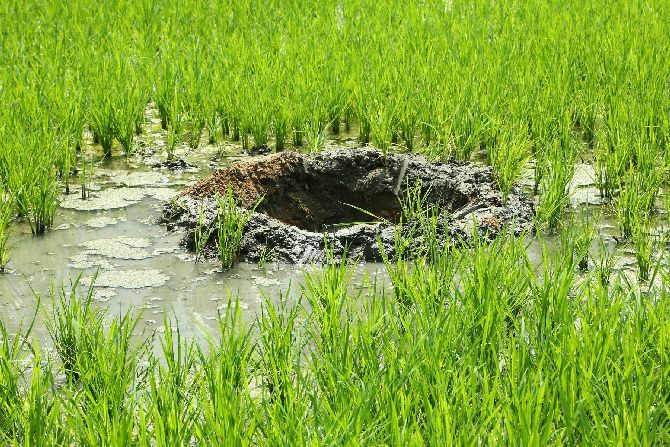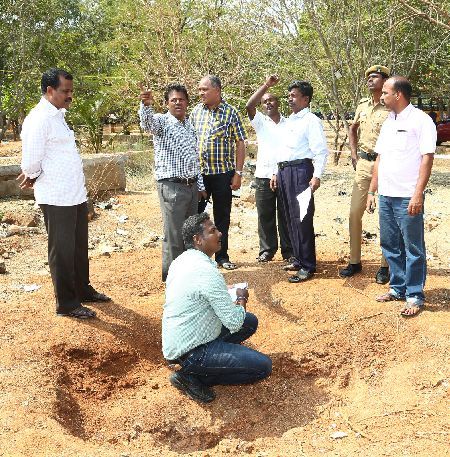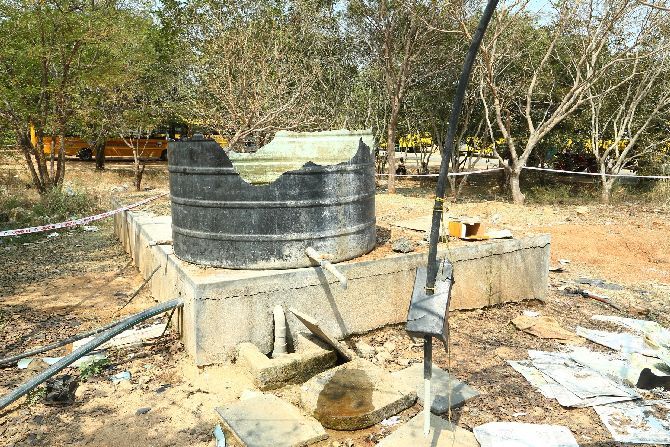
Two mysterious objects seem to have fallen from the sky -- one in a paddy field and one in an engineering college, killing one person.
Shobha Warrier/Rediff.com reports from Natrampalli and Bethaveppampattu in Tamil Nadu.
January 26, 3 in the afternoon.
The time of the day when all farm workers rest in the shade of the trees or in the quietness of open verandahs.
Bethaveppampattu village at the foot of the Yelagiri Hills near Vaniyambadi in Tamil Nadu was in a way asleep when an ear splitting noise woke the villagers. The villagers ran out to see smoke as high as a palm tree emerge from the paddy field.
"The sound was so loud that we had no clue what was happening," says Velu, a farmer who lives opposite the paddy field. "Smoke was everywhere and even the hill was invisible for sometime."
"All of us got so scared. We called the police immediately. Only after the police, the local MLA and the fire engine came that we had the courage to go near the spot," he adds. "In no time, our village was full of people from the neighbouring areas to see what was happening. They also heard the sound."
"This is the first time something like this happened in our village," says Marimuthu, among the first to reach the site.
Once the smoke settled, the villagers discovered a crater in the field. "The police collected some stones and the top soil for investigation. There is a cow shed close to the field, but luckily only one goat was tied there and the sound alarmed it so much that it ran breaking the rope," adds Marimuthu.

February 6, 12.30 in the afternoon.
Students of the Bharatidasan Engineering College (in Natrampalli, around 80 km from Vellore on National Highway 48 from Chennai to Bangalore) were attending their classes.
Principal G Baskar was in his room and the drivers of the college buses were getting ready to have lunch.
"I was sitting in my room looking at some papers. Suddenly, I heard an unusual noise -- loud and thunderous, followed by the entire college building shaking and window panes shattering," recalls Professor Bhaskar.
"It was so abnormal that I thought some explosion had occurred. There was panic in the college and all of us, the entire faculty, staff and students, rushed out of the building. That was when we saw the Sintex water tank near the cafeteria broken, its pieces and water splattered all over the place," adds Professor Baskar.
Paramesh Kumar, the driver of a college bus, had alighted from his bus to have lunch while another driver Kamaraj had gone to wash his face.
"Suddenly, there was a ear-splitting sound. I cannot explain how powerful it was," remembers Paramesh. "It was so loud that for 5, 10 minutes, I became totally deaf and paralysed. There was smoke in front of me and I didn't know what was happening. I just sat on the ground with my eyes closed."
"When I regained my composure," he adds, "I looked up and saw that the water tank had exploded and Kamaraj lying at least 15 feet away. He looked seriously injured. Two gardeners were also injured. We took all of them to the hospital. Kamaraj died there. One gardener needed an eye operation, the other one almost lost hearing in one ear."
Those who looked up say they saw a long stripe of white smoke in the sky. "Like you see, after a rocket goes. I saw it and so did some of my students," says Professor Baskar.
Mangai, who sells soft drinks to travellers on the highway, was almost a kilometre away from the college, but was horrified by the "deafening noise."
"The whole area shook. Many vehicles stopped to check their tyres. Many drivers thought it was a tyre burst. People staying 5 km away heard the noise," she adds.
Principal Baskar called the police who found a dark, bluish, piece of material weighing about 10 grams from the site where a crater had developed. It was sent to the Indian Institute of Astrophysics, Bengaluru.
Similar material recovered from the paddy field in Bethavempattu village was also sent to the Indian Institute of Astrophysics. As the results have not yet come, it cannot be said for certain if what fell in both places was a meteorite.
A similar incident had occurred in Sulagiri near Krishnagiri, 55 km from Vaniyambadi, in 2008. A 105 kilo rock was recovered by the Geological Survey of India and is now kept at the GSI museum in Kolkata.
A circular issued by the Government of India on September 10, 2013 says the Geological Survey of India is the 'custodian of all meteorite falls/finds in India and all such falls/finds have to be registered in the National Meteorite Repository of India in GSI, Kolkata, instantly after reportage.'
Though the circular further says 'it is mandatory that all administrators/heads of central government/state government/Union territories/municipal bodies/educational and research institutes/any private and government authority/media/citizens of India are to inform the director general, GSI immediately regarding any such fall,' state government officials -- neither the collector nor the police -- were aware of such a circular.
The GSI only learnt of the incidents from the media.
More important, the circular states that any part of a meteoritic rock is classified as a contraband item that cannot be freely moved on in India or across the border.

Geological Survey of India Deputy Director General, Tamil Nadu, M Raju has written to the state government to instruct all district collectors to report such cases to the GSI and also hand over any such objects recovered from the area to the GSI.
"The GSI is the nodal agency to collect such objects," says Raju. "We have collected 700 such meteorites from all over the country."
"In 2008, we collected the rock from Sulagiri. I don't know whether it was because Bengaluru was close by that the police passed on the stones they recovered from Natrampalli and Bethaveppampattu to the Indian Institute of Astrophysics. They have not come out with any result so far," he adds.
"They should have first called the state department of geology and mining as there is an additional director in every district. If we had got the samples, within two days, we would have said whether it was a meteorite or not. Instead, every day, people are coming out with some story or the other."
After examining the college campus where a crater had developed, Raju and his team felt that without a sample, they could not authoritatively say if a meteorite had fallen at Natrampalli.
"From the description given by those who witnessed what happened that day," says Raju, "I get the impression that it could be a meteorite. It is only conjuncture as I haven't got any conclusive evidence to say that it was indeed a meteorite."
Raju and his team will visit Bethaveppampattu village only after three months to collect samples.
"If at all, there is any material," he says, "it may be embedded in the mud as it is a cultivated field. I have to wait till the cultivation is over."










